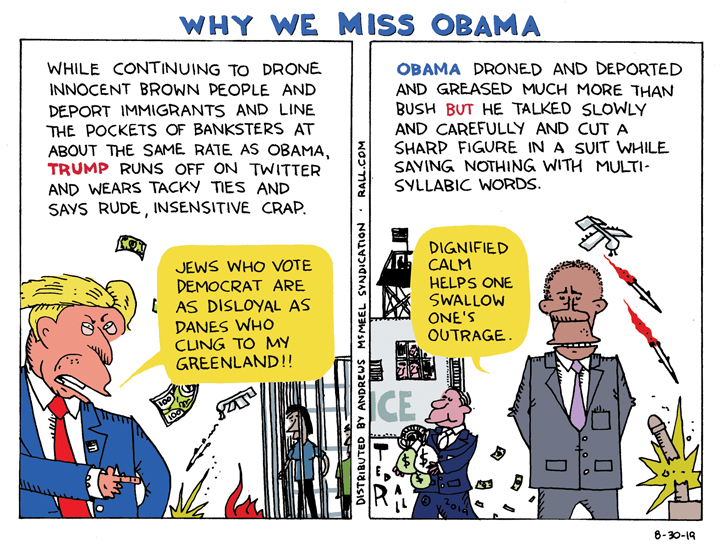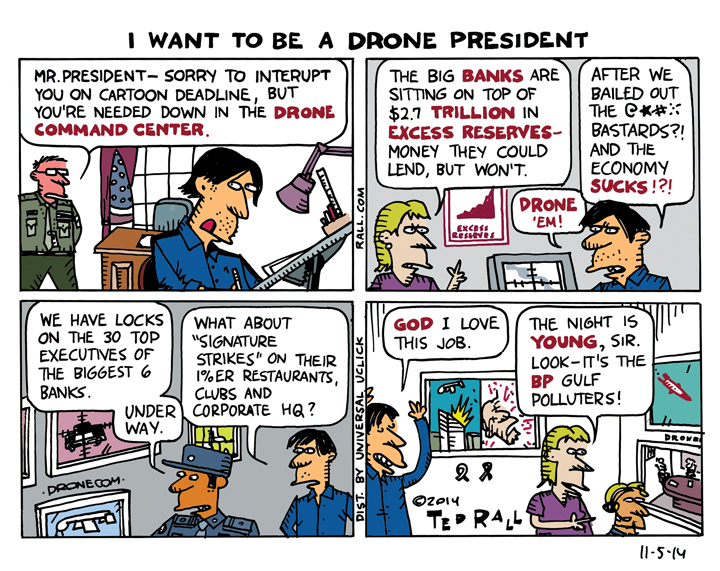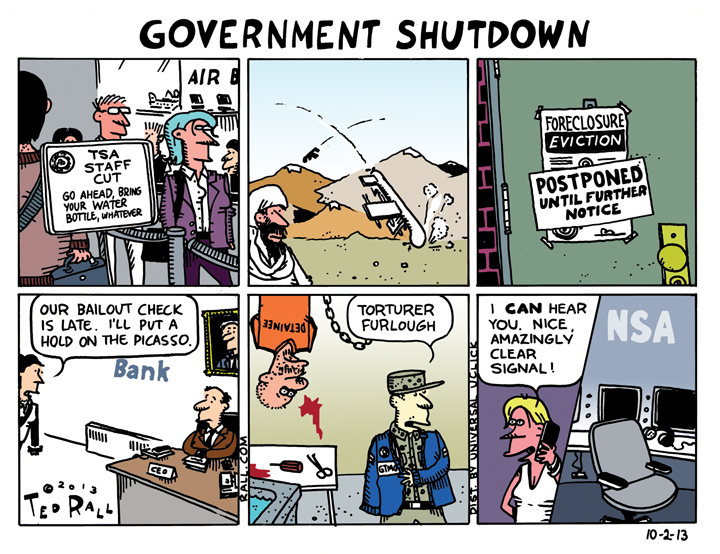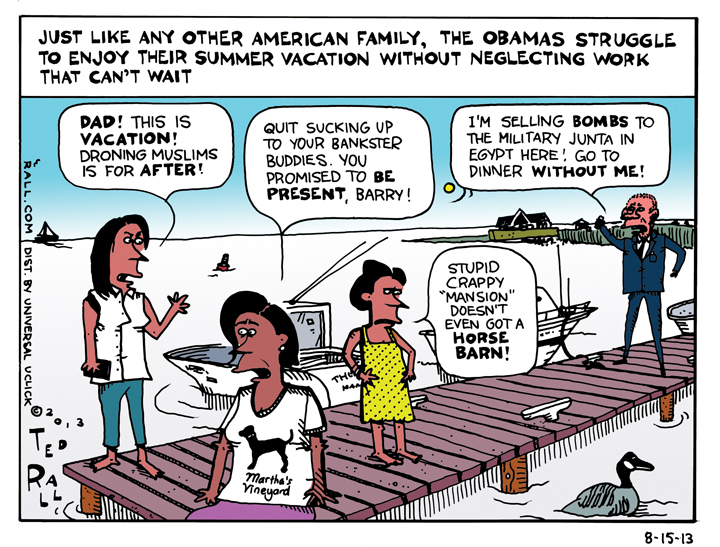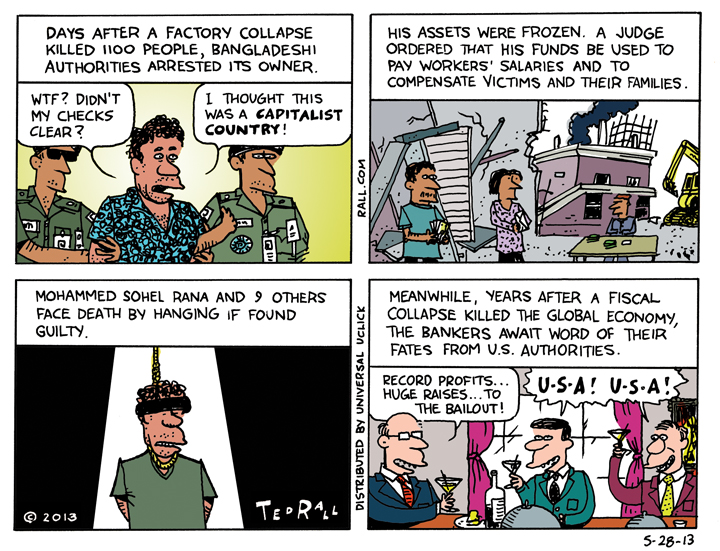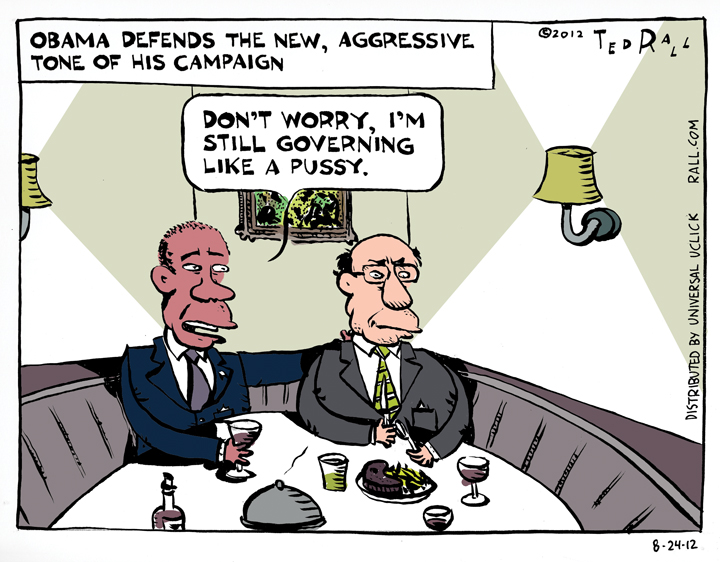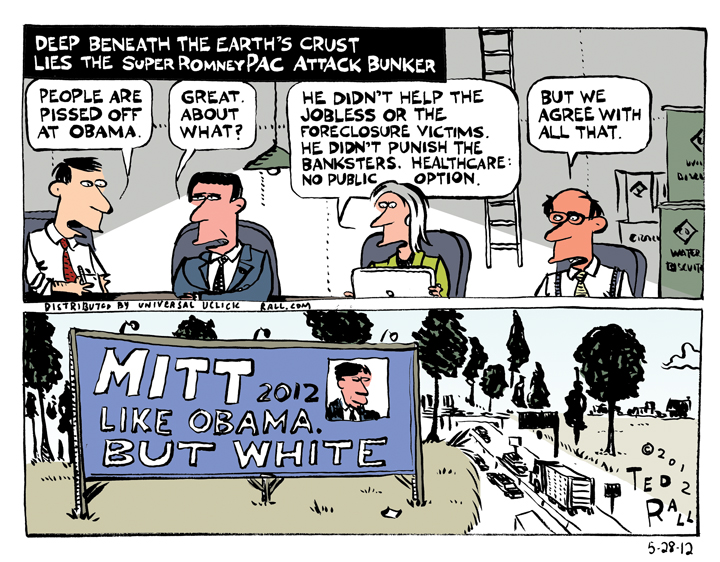Trump’s loudmouth shenanigans have Democrats longing for Obama. But let’s not forget the fact that Obama’s policies and Trump’s don’t differ much.
Just Like Any Other Family
The Obamas head off to their annual vacation in Martha’s Vineyard. But they insist it’s a working vacation. Too bad for the drone victims!
Note: You can buy the original for as little as 99 cents!
SYNDICATED COLUMN: Get Pissed Off and Break Things
Why Are Americans So Passive?
There’s a reason “Keep Calm and Carry On” is everywhere. When people lose everything — their economic aspirations, their freedom, their privacy — when there’s nothing they can do to restore what they’ve lost — all they have left is dignity.
Remember Saddam? Seconds before he was hanged, disheveled and disrespected, the deposed dictator held his head high, his eyes blazing with contempt as he spat sarcastic insults at his executioners. He “faced death like a lion,” said his supposed body double, Latif Yahia, and no one could argue. He left this life with the one thing he could control intact.
Dignity. That’s what “Keep Calm and Carry On” is all about. That’s what we think of when we think of the Battle of Britain. As German bombs rained down, the English went about their business. Like the iconic photo of the milkman tiptoeing over rubble. Like the bomb-damaged stores whose shopkeepers posted signs that read “We are still open — more open than usual.”
Man, that is so not us.
You’ve seen the T-shirts, with their clean Gill Sans-esque lettering and iconic crown. There are mugs, postcards and posters. Of course. It’s a reproduction of a propaganda poster from World War II, an (unsuccessful, because it wasn’t distributed) attempt by the British government to steel jittery citizens during the Blitz.
“Keep Calm and Carry On” merch dates to 2000 but really took off after 9/11; the popularity of the image, the stoicism of its call to stiffen upper lips everywhere, and numerous parodies (“Stay Alive and Kill Zombies”) has generated millions of dollars of profits, inevitably sparking lawsuits and inspiring a song by John Nolan.
Why is a meme originally prepared for a possible German invasion of the UK (which is why it wasn’t released) popular now? Zizi Papacharissi, communications professor at the University of Illinois at Chicago, points to the crappy economy. “We are undergoing a profound and fairly global economic crisis, so it is natural to revisit the saying: Keep calm and carry on. It reminds us of courage shown back then, and how courage shown helped people pluck through a crisis.”
It’s also a reaction to terrorism — or more accurately a reaction to the initial reaction to the 9/11 terrorist attacks: hysteria, jingoism, multiple wars of choice, all doomed. More than any other factor, Obama owed his 2008 victory to his (Maureen Dowd called him) Vulcan personality: cool, implacable, possibly non-sentient, the anti-Dubya.
What wouldn’t we give for a 2001 do-over? No invasions, no Patriot Act, no Gitmo, no “extraordinary renditions,” no New York Times op-ed pieces arguing in favor of “enhanced interrogation techniques.” Treat 9/11 like a crime, let the FBI go after the perps. Reach out to Muslims, reconsider our carte blanche to Israel, and most of all: go slow. Don’t freak out.
Perspective: 3,000 deaths is awful. 9/11 was shocking. We killed 2 million Vietnamese people, yet they’re going strong. With a minimum of whining.
And yet…
Sometimes you need some perspective to your perspective.
There are times when it’s appropriate to freak out. When, in fact, it’s downright weird and unhealthy and wrong not to flip your lid. For example, when you get diagnosed with a terrible disease. When someone you love dies.
There are also times when big-picture, impersonal stuff, including politics and the economy, ought to make you crazy with rage or grief or…something. Not nothing. Not just keeping calm and carrying on.
Keeping calm and carrying on was an appropriate response to the Blitz. Short of moving away from the targeted area, there’s nothing you can do about bombs. Living or dying is a matter of happenstance. Keeping calm might help you make smart decisions. Panic is usually more dangerous than self-control.
The same is true of terrorism. Terrorists will kill you, or not — probably not. You can’t fix your fate.
But that is decidedly not true about the economy. Not when what is wrong with the economy is not something no one can control — a giant meteor, bad weather, panic in the markets — but something that most assuredly can and indeed should be, like the systemic transfer of wealth from the poor and middle-class to the rich that has characterized the class divide in Western nations since the 1970s. The appropriate, intelligent and self-preserving response to mass theft is rage, demands for action, and decisive punishment of political and economic leaders who refuse to change things.
As one revelation about the National Security Agency’s spying follows another, the “Keep Calm and Carry On” meme seems less like an appeal to dignity and calm reserve than the much older, classic response of the power elite to their oppressed subjects: Shut the Fuck Up.
(Ted Rall’s website is tedrall.com. His book “After We Kill You, We Will Welcome You Back As Honored Guests: Unembedded in Afghanistan” will be released in March 2014 by Farrar, Straus & Giroux.)
COPYRIGHT 2013 TED RALL
SYNDICATED COLUMN: Occupy Wall Street – What Comes Next?
Things Have Changed. Time to Adapt.
The Occupy National Gathering, held July 1-4 in Philadelphia, perfectly captures the current state of Occupy Wall Street.
First, the cops pushed the Occupiers around, refusing them space in Independence Park. They wound up in Franklin Square. (Just like old times. In September 2011 Occupiers found Wall Street blocked off by the NYPD. Zuccotti was ad hoc option two.)
Second, the Philly confab was wimpy and watered-down. When one of your honored guests is Daryl Hall of the 1980s duo “Hall & Oates,” militancy is probably off the menu.
Third, the Occupiers weren’t really Occupiers (though many no doubt didn’t know that they’d been coopted by Democratic Party operatives). ONG was yet the latest attempt by front groups set up by MoveOn.org in order to channel the energies of the OWS movement into the Obama reelection campaign.
“What’s going on with Occupy?” people ask me. “We don’t hear anything about them anymore.” By which they mean, they haven’t seen or read anything about OWS in the corporate media. They also probably haven’t “heard” about the enormous street protests in Montreal, which routinely draw 400,000 to 500,000 people, or about Bill 78, a law passed by Quebec’s parliament that suspends the rights of free speech and assembly, which has transformed the province into a police state, or that the real unemployment rate—the way it was calculated before 1980—is 23 percent.)
When your media is this far gone, you don’t “hear” much.
Some say Occupy is dead. Others disagree. “Occupy Will Be Back,” liberal writer Chris Hedges wrote recently.” It is not certain we will win. But it is certain this is not over.” (I don’t know who this “we” is. As far as I’ve heard, the squishy former New York Times journo’s role at Occupy has been limited to book-shilling.)
As a person who helped plan the event that initially sparked OWS; as one who was thrilled by its instant popularity, potency and potential; as someone who participated in the branch of OWS in my own community through the winter, including direct action confronting the authorities—and as a long-time student of historical crises and revolutionary movements—I think it’s less important to guess whether Occupy has a future than to examine how a movement with widespread public support from left and right alike devolved from nearly 2000 public encampments to its current situation: marginalization and cooption.
That said, this summer offers good opportunities for OWSers to make some noise. Occupiers will protest the two major party conventions later this summer. The longer the campaign goes on without either candidate seriously engaging jobs and the economy—hands down the most important issue in Americans’ minds—in a credible way, the more removed from reality the political horserace and its media carnival barkers become, the longer the suffering goes on (and suffering, we sometimes forget, is cumulative, each pain and setback exponentially building upon the last), the more appealing Occupy, or perhaps some more aggressive successor, will be.
Whether the first major street movement since the 1960s survives, grows or metastasizes, we must learn the lessons of Occupy’s first year.
Like every political system, every movement contains the seeds of its future demise. OWS began with an unsustainable premise: occupy public space, yet remain nonviolent. What happens when the cops show up? You leave peacefully. Game over. Which, with the exception of Occupy Oakland—an interesting exception, insofar that clashes with the police increased popular support—is what happened everywhere from lower Manhattan to City Hall Park in Los Angeles.
Occupy should have permitted resistance, violent and/or nonviolent. That, or it shouldn’t have camped out in parks in the first place. Similar movements, in Spain and Russia for example, operate out of offices and churches and use flash-mob tactics to carry out hit-and-run direct actions against banks and other targets. If you’re going to make an Alamo-like stand, well…make a stand.
As I and just about everyone else pointed out at the time, moreover, camping out in the cold sucks. A dumb tactic for a movement that began in the fall and intended to last indefinitely.
Occupy has been overly inclusive. As a reaction to and rejection of the two big corporate-backed political parties, OWS was inherently radical. Yet for week after week, month after month, General Assemblies all over the country have been disrupted and hijacked by liberals, Democrats, and other traditional partisans who don’t share the OWS ideology of non-partisanship and non-affiliation with Ds or Rs, and militant resistance to their backers, the banksters and other corporate hucksters.
Others have criticized OWS’ unwillingness and/or inability to issue a list of demands. Not me. I have seen how the debates within Occupy have empowered voiceless men and women who used to think politics was for politicians. It was—is—powerful.
Let the oppressors try to guess how we may be mollified, how they might avoid revolution. Demands, we believed, would define us too narrowly and separate us from one another.
But things have changed.
We have been kicked out of our encampments. Occupy groups in numerous cities have split into radical and reformist (liberal and/or Democratic) factions.
There really is no place for the liberals within Occupy. Democratic apologists should go where they belong, to volunteer for Obama, to waste their time and money on the torturer of Guantánamo, the drone murderer of Waziristan, he who golfs while the 99% watch their wages shrink and their homes taken away, he who extended his “good war” against Afghanistan through 2024.
We real Occupiers, we radicals, should come together around a list of demands that define us, and allows the wait-and-see public what we’re about, to understand that we are fighting for them—demands that a somewhat reasonable and responsive government would agree to, but cannot and will not because it would counter their insane, addictive greed, their lust to control and own everything, everywhere, everyone.
They even trademark the germs.
There should be demands for justice: prison sentences and fines for the politicos and corporate executives of those whose behavior was not only reprehensible but illegal, along with the seizure of their companies and their properties for the public good. One would start, naturally, with the President.
There should be demands for redress: payments and other material compensation for those who were the victims of crimes, economic and otherwise. Torture victims need counseling and homes, and deserve punitive and compensatory damages; those who lost their homes to illegal foreclosures need not only their old lives back, but also interest and cash penalties to serve as a deterrent to those tempted to engage in such behavior again; the same goes for those who rotted in prison for non-criminal “crimes” like using drugs.
And there should be demands for systemic changes: opening up ballots to third parties; making it illegal for elected representatives to talk to businesspeople, much less accept contributions from them; rigorously enforcing the constitution, laws and treaty obligations so that, for example, Congress gets back the exclusive right to wage war; expanding the Bill of Rights to include such obvious 21st century necessities as a right to a college education should a citizen desire one, a right to a living wage that doesn’t depend upon the whims of local employers, and a right to be treated for any illness, without charge, just because you’re American and you live in the wealthiest society that has ever existed, anywhere.
(Ted Rall’s new book is “The Book of Obama: How We Went From Hope and Change to the Age of Revolt.” His website is tedrall.com.)
(C) 2012 TED RALL, ALL RIGHTS RESERVED.
SYNDICATED COLUMN: Another Obama Sellout
Mortgage Settlement a Sad Joke
Joe Nocera, the columnist currently challenging Tom Friedman for the title of Hackiest Militant Centrist Hack—it’s a tough job that just about everyone on The New York Times op-ed page has to do—loves the robo-signing settlement announced last week between the Obama Administration, 49 states and the five biggest mortgage banks. “Two cheers!” shouts Nocera.
Too busy to follow the news? Read Nocera. If he likes something, it’s probably stupid, evil, or both.
As penance for their sins—securitizing fraudulent mortgages, using forged deeds to foreclose on millions of Americans and oh, yeah, borking the entire world economy—Ally Financial, Bank of America, Citibank, JPMorgan Chase and Wells Fargo have agreed to fork over $5 billion in cash. Under the terms of the new agreement they’re supposed to reduce the principal of loans to homeowners who are “underwater” on their mortgages—i.e. they owe more than their house is worth—by $17 billion.
Some homeowners will qualify for $3 billion in interest refinancing, something the banks have resisted since the ongoing depression began in late 2008.
What about those who got kicked out of their homes illegally? They split a pool of $1.5 billion.
Sounds impressive. It’s not. Mark Zuckerberg is worth $45 billion.
“That probably nets out to less than $2,000 a person,” notes The Times. “There’s no doubt that the banks are happy with this deal. You would be, too, if your bill for lying to courts and end-running the law came to less than $2,000 per loan file.”
Readers will recall that I paid more than that for a speeding ticket. 68 in a 55.
This is the latest sellout by a corrupt system that would rather line the pockets of felonious bankers than put them where they belong: prison.
Remember TARP, the initial bailout? Democrats and Republicans, George W. Bush and Barack Obama agreed to dole out $700 billion in public—plus $7.7 trillion funneled secretly through the Fed—to the big banks so they could “increase their lending in order to loosen credit markets,” in the words of Senator Olympia Snowe, a Maine Republican.
Never happened.
Three years after TARP “tight home loan credit is affecting everything from home sales to household finances,” USA Today reported. “Many borrowers are struggling to qualify for loans to buy homes…Those who can get loans need higher credit scores and bigger down payments than they would have in recent years. They face more demands to prove their incomes, verify assets, show steady employment and explain things such as new credit cards and small bank account deposits. Even then, they may not qualify for the lowest interest rates.”
Financial experts aren’t surprised. TARP was a no-strings-attached deal devoid of any requirement that banks increase lending. You can hardly blame the bankers for taking advantage. They used the cash—money that might have been used to help distressed homeowners—to grow income on their overnight “float” and issue record raises to their CEOs.
Next came Obama’s “Home Affordable Modification Program” farce. Another toothless “voluntary” program, HAMP asked banks to do the same things they’ve just agreed to under the robo-signing settlement: allow homeowners who are struggling to refinance and possibly reduce their principals to reflect the collapse of housing prices in most markets.
Voluntary = worthless.
CNN reported on January 24th: “The HAMP program, which was designed to lower troubled borrowers’ mortgage rates to no more than 31% of their monthly income, ran into problems almost immediately. Many lenders lost documents, and many borrowers didn’t qualify. Three years later, it has helped a scant 910,000 homeowners—a far cry from the promised 4 million.”
Or the 15 million who needed help.
As usual, state-controlled media is too kind. Banks didn’t “lose” documents. They threw them away.
One hopes they recycled.
I wrote about my experience with HAMP: Chase Home Mortgage repeatedly asked for, received, confirmed receiving, then requested the same documents. They elevated the runaround to an art. My favorite part was how Chase wouldn’t respond to queries for a month, then request the bank statement for that month. They did this over and over. The final result: losing half my income “did not represent income loss.”
It’s simple math: in 67 percent of cases, banks make more money through foreclosure than working to keep families in their homes.
This time is different, claims the White House. “No more lost paperwork, no more excuses, no more runaround,” HUD secretary Shaun Donovan said February 9th. The new standards will “force the banks to clean up their acts.”
Don’t bet on it. The Administration promises “a robust enforcement mechanism”—i.e. an independent monitor. Such an agency, which would supervise the handling of million of distressed homeowners, won’t be able to handle the workload according to mortgage experts. Anyway, it’s not like there isn’t already a law. Law Professor Alan White of Valparaiso University notes: “Much of this [agreement] is restating obligations loan servicers already have.”
Finally, there’s the issue of fairness. “Underwater” is a scary, headline-grabbing word. But it doesn’t tell the whole story.
Tens of millions of homeowners have seen the value of their homes plummet since the housing crash. (The average home price fell from $270,000 in 2006 to $165,000 in 2011.) Those who are underwater tended not to have had much equity in their homes in the first place, having put down low downpayments. Why single them out for special assistance? Shouldn’t people who owned their homes free and clear and those who had significant equity at the beginning of crisis get as much help as those who lost less in the first place? What about renters? Why should people who were well-off enough to afford to buy a home get a payoff ahead of poor renters?
The biggest fairness issue of all, of course, is one of simple justice. If you steal someone’s house, you should go to jail. If your crimes are company policy, that company should be nationalized or forced out of business.
Your victim should get his or her house back, plus interest and penalties.
You shouldn’t pay less than a speeding ticket for stealing a house.
(Ted Rall is the author of “The Anti-American Manifesto.” His website is tedrall.com.)
COPYRIGHT 2012 TED RALL

